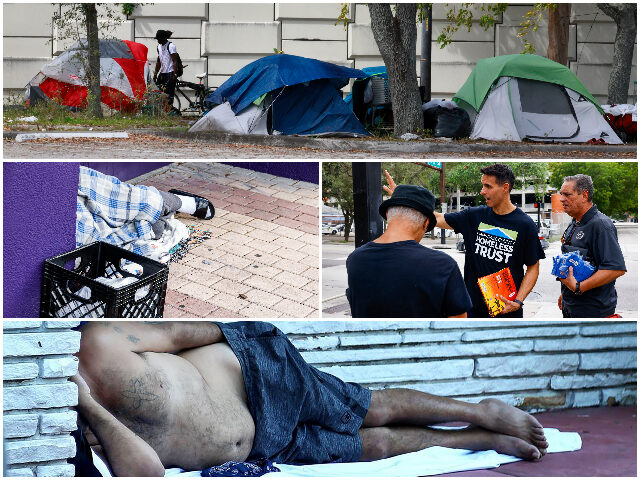The Florida House has passed a bill to prevent homeless individuals from sleeping in public places, requiring local governments to create homeless camps instead.
HB 1365 passed the Republican-controlled House in a “near party-line” Friday vote, reports Fox News.
“Florida had the nation’s third-highest homeless population as of 2022, with nearly 26,000,” the outlet reported.
The state contributes to six percent of the national total of unsheltered individuals, with 15,482 homeless people “living in places not meant for human habitation” in 2023, according to an Axios report.
“The state also had some of the nation’s largest increases of families with children and veterans experiencing homelessness between 2022-2023,” the report found.
This bill is supported by Gov. Ron DeSantis (R), who called it a way to “combat homelessness and keep Florida’s streets clean.”
“We cannot allow any city in Florida to become like San Francisco, where homelessness, drugs, and crime have decimated the quality of life, hurt the economy, and eroded freedom,” he said in early February when promoting the legislation. “In Florida we will continue to enact policies that promote accountability and community safety, unlike in California where they are promoting dangerous policies that harm their communities and economy.”
A 2020 California Senate Housing Committee report found that Democrat-run California had 161,548 homeless people, accounting for 28 percent of the nation’s entire homeless population.
The vast majority of California’s homeless people are unsheltered, with 113,660, or 70.4 percent, living outside or in makeshift structures. Overall, California accounts for about half of the nation’s unsheltered homeless population.
HB 1365 would prohibit city and county governments from allowing people to sleep on public property, including public buildings and sidewalks. Residents and business owners will be allowed to sue their local governments for allowing such homeless encampments to continue.
“Some counties would be exempt from certain requirements under the proposal if these requirements would create financial hardship,” Fox noted.
The bill would also certify local governments to designate areas for encampments if the locations “meet standards established by the Florida Department of Children and Families,” the report added.
The designated areas have to include facilities for restrooms, running water, security, and be completely drug and alcohol-free. Homeless people will be allowed to stay in such sites for up to a year, as long as the facilities don’t harm the “safety or value of nearby properties.”
Rep. Sam Garrison (R) sponsored the bill. While he says it “isn’t going to eliminate homelessness,” changes need to be made to combat the homelessness crisis.
“This is not a bill designed to put people out of sight, out of mind. It’s quite the opposite,” Garrison said on the House Floor.
The status quo is not acceptable. When it gets to a point where the problem exceeds the resources to address it, the cost of dealing with it on the back end is inevitably 10 times what it would be on the front end.
With no security, with no basic sanitation, with no access to behavioral health services for folks who have been ravaged by drug abuse and mental illness…the answer is let’s get a home for everybody. If we do nothing for these folks, that is unacceptable.
Democrat representatives are criticizing the bill, with Rep. LaVon Bracy Davis saying the potential law is trying to criminalize homeless people while “bullying municipalities and counties into doing what we want them to do.”
“We must acknowledge that pushing the unhoused out of sight isn’t a solution. It is a failed attempt to sweep a societal problem under the rug,” she said.
According to Rep. Anna Eskamani (D), Florida legislators should instead make “robust investments in transitional housing and shelters.”
“But no, instead, we want to designate a location that’s probably going to be really hard to identify,” she said.
A similar proposal is set to be viewed in the Florida Senate on Monday.

COMMENTS
Please let us know if you're having issues with commenting.